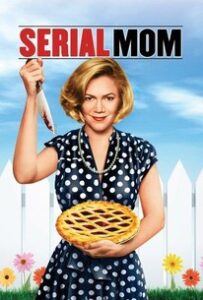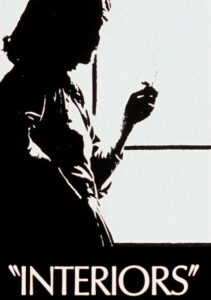Serial Mom-1994
Director John Waters
Starring Kathleen Turner, Sam Waterston, Ricki Lake
Scott’s Review #1,432
Reviewed July 8, 2024
Grade: A-
Serial Mom (1994) is led by an uproarious performance by Kathleen Turner, in the 1990s still in her cinematic heyday, the latter-day John Waters comedy fires on all cylinders. She wickedly goes full steam ahead in a pulsating performance deliciously deserving of an Oscar nomination.
The film is directed by Waters, known for perverse and gross-out fare like Pink Flamingos (1972) and Female Trouble (1975) so any chance for an Academy Award is laughable.
Though, Serial Mom is much safer than those films choosing slick 1990s mainstream camerawork over raw shots of dogshit on the sidewalk.
Still, Turner hits it out of the park playing a ‘June Cleaver’ character with a murderous dark side.
Beverly Sutphin (Turner) appears to be an unassuming upper-middle-class housewife living with her dentist husband Eugene (Sam Waterston) and their teenage children, Misty (Ricki Lake) and Chip (Matthew Lillard), in suburban Maryland.
She is secretly a serial killer who kills people over trivial slights or offenses like insulting her son or blowing off her daughter. The dastardly mom uses creative weapons like her station wagon and a fire poker to kill her prey.
Serial Mom is strictly for ravenous fans of Waters and I’m not sure it will win any new fans over. But I’ll stress how much of a mainstream affair it is compared to his more dangerous 1970s films.
It pairs well in look and feel with Hairspray from 1988 and both films star Ricki Lake.
Some have referred to it as a slasher film but that would steer it in the horror vein or knife-wielding maniac territory. Beverly isn’t Freddie, Jason, or Michael Meyers. She is fun and does as much damage with a sneer or a smirk as with a weapon.
Beverly is also the type of woman you’d like to be friends with but are terrified of crossing. After all, she kills in the defense of her kids so she’s a good mother with a wicked sense of humor.
When she delights in crank-calling her neighbor Dottie Hinkle (deliciously played by Waters’s regular Mink Stole) to get a rise out of her, we cheer her on.
Later, when charged and sent to trial for her dirty deeds, she fires her attorney and takes over her case amid rabid fan response. Beverly becomes a local hero.
She’s a cinema villain to remember.
Waters is great because he finds the perfect balance of camp and wit to make a smart film not merely a slapstick one. Many cinema comedies don’t work because the laughs feel canned instead of fresh.
The writing and the cast make Serial Mom a winner.
The ridiculous antics and situations Beverly gets involved in make the audience want to know what she does next. Who doesn’t love a well-to-do character who turns sinister? It’s fun to watch a rich suburban town turn into a shit show of high entertainment.
Besides Stole, my favorite supporting actors are Mary Jo Catlett and Matthew Lillard. Catlett has brilliant comic timing as a neighbor, Rosemary, while Lillard was on the cusp of becoming a horror/comedy star with 1996’s Scream.
Regarding cameos, I could have done without the Suzanne Somers cameo playing herself which didn’t land all that funny but Patty Hearst as juror #8 is a winner.
The ‘white shoes after Labor Day’ sequence is hysterical.
Serial Mom (1994) is a cult classic for the ages and on par with most of John Waters earlier, classic raunchy comedies.

